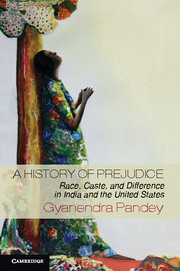1 - Introduction
Published online by Cambridge University Press: 05 February 2013
Summary
How does one begin to write a history of prejudice, something that by definition resists historicization – and even acknowledgment? I attempt to do so in this book by examining the process of otherization (an inelegant word to describe an inelegant practice), of social and political distancing that is a central part of the history of African Americans and Dalits (ex-Untouchables, or Scheduled Castes as they are called in the Indian constitution of 1950), two long subordinated and stigmatized groups in the United States and India, respectively. It is my view that the juxtaposition of two very different locations and histories (the African American and the Dalit) and, within each of them, of very different kinds of public and private narratives of struggle allows for an uncommon analysis of the workings of prejudice in an intriguing complex of forms and places.
In order to deepen and extend the inquiry that follows, I make another move that is perhaps not entirely predictable. I start with a rough-and-ready distinction between what one might call “vernacular” and “universal” prejudices. The former is, in simple terms, local, localizable, relatively visible, and sometimes acknowledged: say, the prejudice against blacks, “Untouchables,” gays, Muslims, Jews, conquered indigenous populations, recent immigrants, women, and other “minorities.” It refers to calculated behavior that we sometimes condemn – when we notice it, or when it is forced on our attention: racism, casteism, patriarchy, heteronormativity, reductive monoculturalism, prejudice thus as bias, malice, or inherited structures of discrimination, which the state believes it can measure or contain. I have called such prejudice “vernacular” in order to distinguish it from another kind, which is largely invisible because it is widespread (“universal”) and hence seen as “natural.” This “universal” is the language of law and state, and it passes for the common sense of modern society, rarely acknowledged as prejudice. At this level, the history of prejudice becomes even more intractable for it is, simultaneously, everywhere and nowhere.
- Type
- Chapter
- Information
- A History of PrejudiceRace, Caste, and Difference in India and the United States, pp. 1 - 33Publisher: Cambridge University PressPrint publication year: 2013



